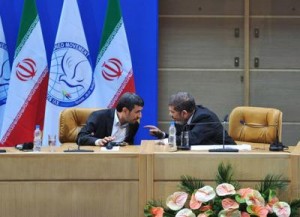Article published in openDemocracy and Egypt Monocle
When Egypt’s Hosni Mubarak was forced to step down on 11 February 2011, the clerics in Tehran beamed with a smug of satisfaction that the divine hand had chosen Iran’s Revolution Day for the Pharaoh’s downfall. It could not have been a more surreal start for the besieged Islamic republic seeking to break out of its isolation and gridlock vis-à-vis a regional reconfiguration.
Fast-forward to the recent reported saga at the Non-Aligned Movement summit in Iran, in which Egyptian president Morsi (given the red carpet treatment and all) diverged from the Iranian script when he stated, “Our solidarity with the struggle of the Syrian people against an oppressive regime that has lost its legitimacy is an ethical duty as it is a political and strategic necessity.”

The Syrian delegation walked out in fury and Iranian state TV attempted to limit the damage to their Syrian ally by mistranslating Morsi’s words to the effect of “solidarity with the Syrian nation against the plot that has been implemented against this country.” Business as usual in Iran.
This was Iran’s opportunity to upstage the world by proving it has friends, and Morsi ruined the show.
The incident exposes deeper Iranian, if not regional, frustrations as to where Egypt’s foreign policy orientation is heading.
With Iran rapidly losing its only foothold in the Arab World via Syria, deteriorating relations with Turkey, hostile Gulf States that house US armed forces, and Israel of course, Iran is keener than ever to find regional allies. It pinned its hopes on Egypt from the early days of the Tahrir Square protests and sit-ins.
In the aftermath of Mubarak’s overthrow, Iran, in a not so tactful way of starting a new chapter, sent two warships through the Suez Canal to test the waters with the post-Mubarak Egypt. They were let through conditionally in a sign of goodwill.
Iran set out to explore all possible avenues of rapprochement with Egypt.
Clash of soft powers
Iranian officials and diplomats I have encountered, more than any other foreign dignitaries, are ready to factor their ancient (yes, that is pre-Islamic) history into their arguments to underscore their positions – including the meeting of “two great civilisations.”
Yet we do not need to go back to the Sassanid Persian Empire or Pharaonic Egypt to find evidence of good and sometimes not so good associations.
Modern Egypt-Iran relations have been as intimate as Egypt’s King Farouk’s sister, Princess Fawzia Fuad, marrying the crown-prince, later Shah, Pahlavi of Iran (in other words, an Egyptian was the Queen of Iran for almost ten years before she divorced in 1949), and that last Shah is buried in Cairo.
Diplomatic relations were severed following Egypt’s peace treaty with Israel which coincided also with the Iranian revolution.
The Mubarak regime crafted an anti-Iranian and anti-Shiite agenda as it threw in its lot with the US, Israel and the Gulf monarchies. What was telling, however, about Mubarak’s policies was that the Egyptian street, unlike their Gulf counterparts, stubbornly refused to come around to the regime’s view of an Iranian/Shiite threat. Egyptians often felt Israel was much more of a threat than far away Iran.
Moreover, Egypt does not suffer historically-induced Sunni-Shiite tensions. On the contrary, the Shiite Fatimid dynasty that ruled Egypt for 200 years arguably left behind it a constructive legacy that continues to influence the social structure of Egypt today. Al-Azhar, now the seat of Sunni learning, is evidence of that.
Of all Sunni Islamist movements, the Muslim Brotherhood, as Dina Samir points out is much more pragmatic and is imbibed with less of the anti-Shiite ideology as indicated in the organisation’s official website: “Under the influence of the tolerant Brotherhood, Egyptians are more comfortable with Shiite Islam than other Sunnis in other Arab countries.”
Enter strategic power
Yet for all the talk of common bonds, Egypt, like Iran, also thinks in geostrategic terms. For years, Egypt has been frustrated at being sidelined in the regional order. If Iran was surprised at Morsi’s bold statements at the summit, then so were the US and Israel who pressured Morsi not to attend the summit but to little avail.
If signalling is the currency of international relations, then Morsi’s first state visit to China, rather than to the US, is indicative of his early attempts to chart an independent course.
The other factor is Egypt appears to be making up (or attempting to) ground with Iran and Turkey in exerting its regional leadership – this is why multilateral bodies are a crucial opportunity for Egypt to amplify its voice.
Morsi is committed to the Arab uprisings that set the chain reaction going that eventually brought him to the seat of power; and those dynamics are being replicated (although more violently) in neighbouring Syria. Iran is finding it difficult to insert itself into such emerging narratives.
Iranian policies are certainly not helping. In the past, if Iran could not win over Arab governments, it could at least garner sympathy from the Arab street. For example, Iran’s support for the Sunni Hamas gave the republic a cover of legitimacy as a state concerned with the interests of the Palestinians, unlike the hopelessly despotic Arab regimes.
Projecting their 1979 worldview onto the Arab revolutions, some 214 Iranian parliamentarians signed a statement supporting the uprising against Mubarak’s tyranny at the height of Egypt’s tumultuous 18 days. Yet when it came to Syria, there was all of a sudden an international conspiracy against the Syrian state and Syria’s protesters were being funded by enemies from abroad.
To Arab societies, Syria is not considered a peripheral Arab state and an assault on the Levantine country is seen as a strike against a vital organ of the Arab world.
One can even arguably make the case that Iran is outdoing Saudi Arabia in worsening the Sunni-Shia divide. To the commoner on the Arab streets, there is no rationale to support the dying bloody Syrian regime unless that support is based on sectarian grounds, i.e. Iranian support for their Shia-Alawite brethren.
One Arab diplomat who called me following his attendance at the summit noted that Iranian faces in the audience were flustered when Morsi opened his speech with prayers for the Prophet’s family and the four rightly guided caliphs by name (Abu bakr, Omar, and Othman are all an anathema to Shiites, with Ali as the exception).
Rather than wanting to offend, Morsi was also addressing his domestic constituencies and signaling to Turkey and Saudi Arabia that Egypt is not going to be a minor player in, what appears to be, an evolving Sunni troika alliance. Which also sadly explains why Bahrain was absent from Morsi’s speech, so as not to offend his Saudi partners.
Morsi’s triumphant return back home was to shouts of “Morsi didn’t mince his words” and “Raise your head up high, you are Egyptian.” It’s clear that this new populism has been sorely missed from the Egyptian scene over quite a period.
Overlapping interests that include the Palestinians, trade, Suez Canal access, petroleum, and an Egyptian faltering economy will lead to an improvement in Egypt-Iran relations despite this episode and the Syrian question. It’s just that Egypt, like a prisoner released after decades of incarceration, is trying to find its place again in the world.






